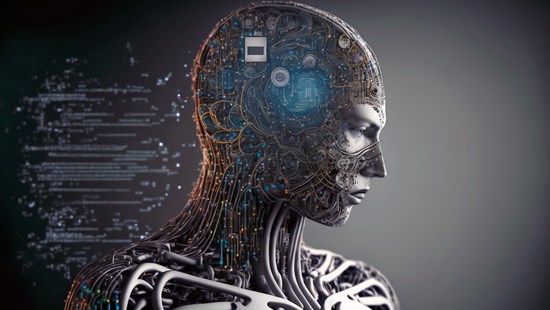
Oliver Tostevin, an analyst for the Ravenscroft Blue Chip Fund, writes this week’s update.
Two words capture the zeitgeist of the investment world in 2024: artificial intelligence. You’ve heard plenty from us on this topic already, and there will be more to come, but I thought I’d take a slightly different approach today.
The most eye-opening thing I’ve read in recent years is Iain McGilchrist’s The Matter With Things. A psychiatrist by training, McGilchrist is an interdisciplinary writer of rare insight. While his book addresses some of the biggest questions such as the nature of consciousness and reality, really his magnum opus is his work on the differences between the two hemispheres of the brain. In making his case McGilchrist cites hundreds of studies from the medical literature – most notably, those cases where the hemispheres become separated or otherwise impaired.
In basic terms the left hemisphere is analytical and hyper logical. It comprehends the world by breaking it down into decontextualised parts, viewing things as machines. It likes to categorise. It uses these findings to create models to then infer more widely about the world. It is quick and it is never wrong. The right hemisphere, by contrast, is holistic and cognisant of the big picture - things can only be understood as a contextual whole. It works intuitively and imaginatively. Unlike the left, it’s comfortable with uncertainties. The right is concerned with the real world, rather than models thereof. McGilchrist convincingly argues that the right hemisphere is inherently more reliable. While both hemispheres are important to overall understanding, the evidence shows that the left hemisphere can be literally delusional in the absence of the right hemisphere’s moderating influence.

McGilchrist worries that the modern world has become overly reliant on the left hemisphere. In practice this means a preference for rules, categories, models and certainties, while demoting the role of intuition, creativity, ambiguity and holistic thinking. He suggests we can improve our thinking with a considered framework: ideas can first be explored intuitively by the right before being passed to the left for a detailed examination, with a final check by the right to ensure that the result actually coheres to reality.
My title for this piece comes from a recent essay, based on a speech McGilchrist gave in 2022 before the current craze in generative AI and large language models (LLMs) got underway:
AI—artificial information-processing, by the way, not artificial intelligence—could in many ways be seen as replicating the functions of the left hemisphere at frightening speed across the entire globe. The left hemisphere manipulates tokens or symbols for aspects of experience. The right hemisphere is in touch with experience itself, with the body and deeper emotions, with context and the vast realm of the implicit. AI, like the left hemisphere, has no sense of the bigger picture, of other values, or of the way in which context—or even scale and extent—changes everything.
LLMs are indeed eerily reminiscent of McGilchrist’s characterisation of the left hemisphere. For example, they are prone to delusion and can suffer from an absurd lack of context. With businesses now jumping on the bandwagon and racing to roll out LLMs across their operations, it is imperative that they learn to use them, and other AI technologies, thoughtfully. To do otherwise, is to let the left hemisphere run amok – resulting in mediocrity at best and disaster at worst. We fear this could be the path for many businesses in the years ahead.
As part of the Blue Chip team, we’re interested in businesses that have implicitly internalised McGilchrist’s framework with respect to AI. A great example is WPP, the world’s largest advertising business. The advertising industry has always been populated by “creatives” with a right hemisphere bias. WPP has been investing heavily in AI technologies in order to help its creatives be more effective in their work – but critically, the process will continue to begin and end with something LLMs cannot do: imagination. It seems then that WPP are making the most of both hemispheres, rather than relying on one – and that feels like the best approach to us. Paradoxically, investors currently assume (judging by WPP’s historically low stock market valuation) that the company has no place in a world of generative AI – why pay an advertiser when ChatGPT can write copy for you? We beg to differ, believing that creativity has never been more important for those who wish to stand out from a sea of uniformity. If WPP get it right, their services are likely to be highly valued for many years yet.

